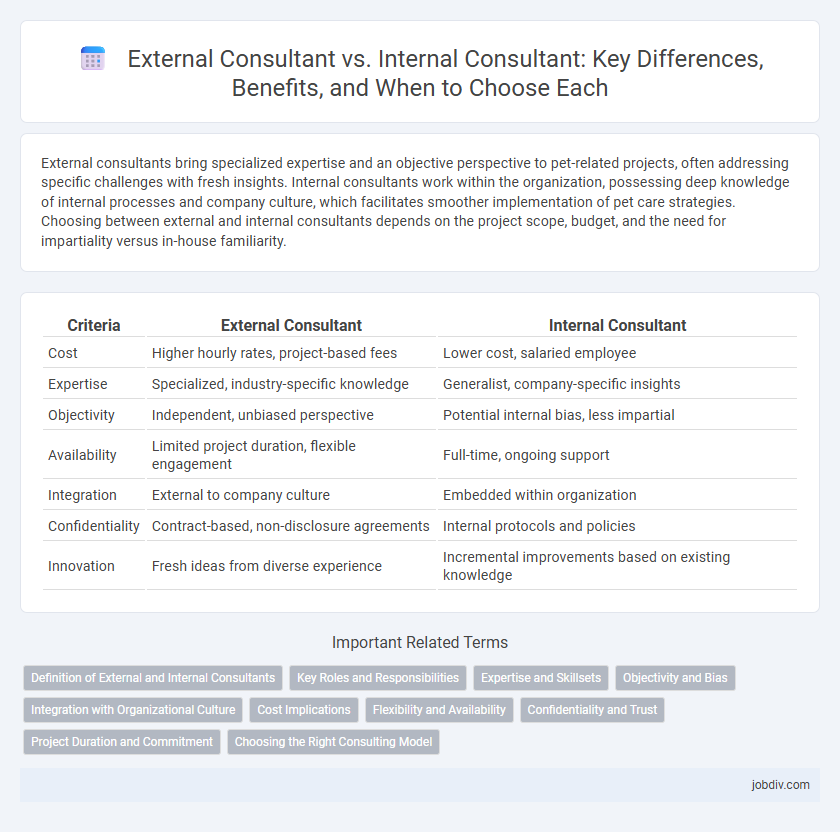External consultants bring specialized expertise and an objective perspective to pet-related projects, often addressing specific challenges with fresh insights. Internal consultants work within the organization, possessing deep knowledge of internal processes and company culture, which facilitates smoother implementation of pet care strategies. Choosing between external and internal consultants depends on the project scope, budget, and the need for impartiality versus in-house familiarity.
Table of Comparison
| Criteria | External Consultant | Internal Consultant |
|---|---|---|
| Cost | Higher hourly rates, project-based fees | Lower cost, salaried employee |
| Expertise | Specialized, industry-specific knowledge | Generalist, company-specific insights |
| Objectivity | Independent, unbiased perspective | Potential internal bias, less impartial |
| Availability | Limited project duration, flexible engagement | Full-time, ongoing support |
| Integration | External to company culture | Embedded within organization |
| Confidentiality | Contract-based, non-disclosure agreements | Internal protocols and policies |
| Innovation | Fresh ideas from diverse experience | Incremental improvements based on existing knowledge |
Definition of External and Internal Consultants
External consultants are independent professionals or agencies hired temporarily to provide specialized expertise and objective insights, often bringing industry best practices and external perspectives to an organization. Internal consultants are employees within a company who use their in-depth knowledge of the organization's culture, processes, and goals to offer tailored solutions and support continuous improvement. Both roles aim to enhance organizational performance but differ in terms of affiliation, scope, and integration within the business.
Key Roles and Responsibilities
External consultants provide specialized expertise and objective insights, handling project-based tasks such as strategy development, process improvement, and change management. Internal consultants focus on continuous organizational support, driving internal initiatives, aligning projects with company culture, and facilitating cross-department collaboration. Key responsibilities of external consultants include delivering tailored recommendations and industry benchmarks, while internal consultants prioritize knowledge transfer, employee training, and maintaining long-term business objectives.
Expertise and Skillsets
External consultants bring specialized expertise and diverse industry experience tailored to specific project needs, often offering innovative solutions and an objective perspective. Internal consultants possess deep organizational knowledge and long-term strategic insight, enabling them to align recommendations closely with company culture and internal processes. The choice between external and internal consultants depends on the required skillsets, project scope, and the value of external objectivity versus internal familiarity.
Objectivity and Bias
External consultants offer greater objectivity by providing impartial assessments free from internal politics or organizational biases. Internal consultants, while deeply familiar with company culture and processes, may face challenges in maintaining neutrality due to existing relationships and vested interests. Companies often leverage external consultants specifically to minimize bias and gain an unbiased perspective on complex issues.
Integration with Organizational Culture
External consultants offer specialized expertise and an objective perspective but may face challenges aligning with the organization's existing culture and internal workflows. Internal consultants possess deep knowledge of company values and employee dynamics, enabling seamless integration and more effective change management. Successful consultancy outcomes often depend on balancing external innovation with internal cultural alignment to foster sustainable organizational growth.
Cost Implications
External consultants often entail higher immediate costs due to premium hourly rates and contract fees, but they provide specialized expertise without ongoing employment expenses. Internal consultants, while incurring salaries and benefits, offer long-term cost efficiency through deeper organizational knowledge and continuous availability. Balancing external consultancy costs against internal resource allocation is crucial for optimizing budget impact in project management.
Flexibility and Availability
External consultants offer greater flexibility by adapting to diverse projects across multiple industries, enabling organizations to access specialized expertise on demand. Internal consultants provide consistent availability rooted in an in-depth understanding of the company's culture, processes, and long-term goals. Choosing between external and internal consultants depends on the required agility and immediate accessibility needed for specific strategic or operational challenges.
Confidentiality and Trust
External consultants often provide unbiased expertise while maintaining strict confidentiality agreements to protect sensitive client information. Internal consultants benefit from established trust within the organization due to their ongoing presence but must carefully navigate internal politics to preserve confidentiality. Both types require robust data protection practices to uphold client trust and ensure secure handling of proprietary information.
Project Duration and Commitment
External consultants typically engage in projects with shorter durations, offering specialized expertise for specific challenges without long-term organizational commitment. Internal consultants are embedded within the company, providing continuous support and adapting to evolving business needs over extended periods. Project duration and commitment levels directly influence the choice between external and internal consultancy based on flexibility and resource availability.
Choosing the Right Consulting Model
Choosing the right consulting model depends on the organization's specific needs, budget, and project scope. External consultants bring specialized expertise and an unbiased perspective, ideal for short-term, highly technical, or confidential projects, while internal consultants offer deeper organizational knowledge and faster integration, making them suitable for ongoing strategic initiatives. Evaluating factors such as cost efficiency, access to industry best practices, and alignment with corporate culture ensures the optimal balance between external innovation and internal continuity.
External Consultant vs Internal Consultant Infographic

 jobdiv.com
jobdiv.com